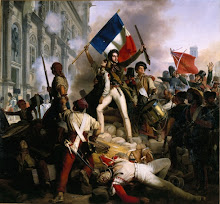
The French Revolution took place from 1789 up to 1794. From the second half of the 700’s France fall in a big economic problem. The population on France was divided in three social classes: The king and the aristocrats, the Noble families, and finally by the workers, farmers; the poor population.
In 1789 the king wanted that the population forgot about the Revolution and supported the king Louis XVII, but still the people kept on doing revolutionary campaigns and revolts. Louis XVII decided to scare his people making them stop by making the kings soldiers surround Paris. The citizens got even more angry by this action and finally decided that the they would have destroyed the Ancien Regime.
On 14 July 1789 a crowd of 60,000 people attacked the King’s fortress prison of the Bastille in Paris, they entered the fortress with arms and managed to free the prisoners who mainly were politics that defended the revolution. They captured the governor and executed him. This was the beginning of a revolution!
For more information on the storming of the bastille read the following pages of the Blog:
· Charles Dickens, point of view
· Historians, point of view
· What people do people think of it today?
Website written by:
Bombelli Federica, Casanova Clara, Imoda Lodovica, Jesus Maria
Pubblished in 2007






